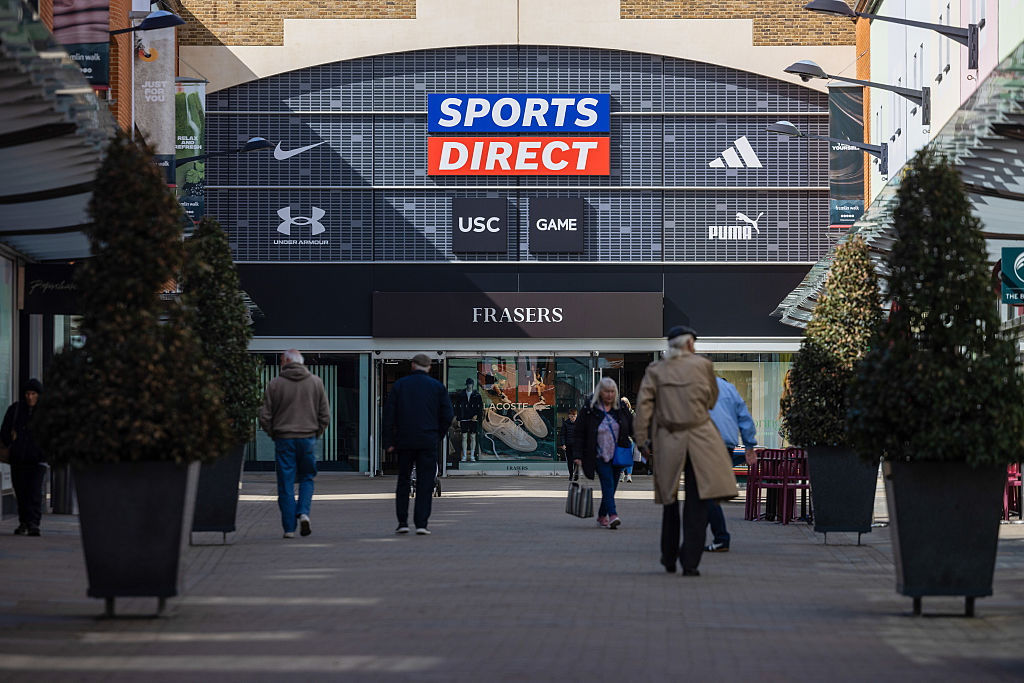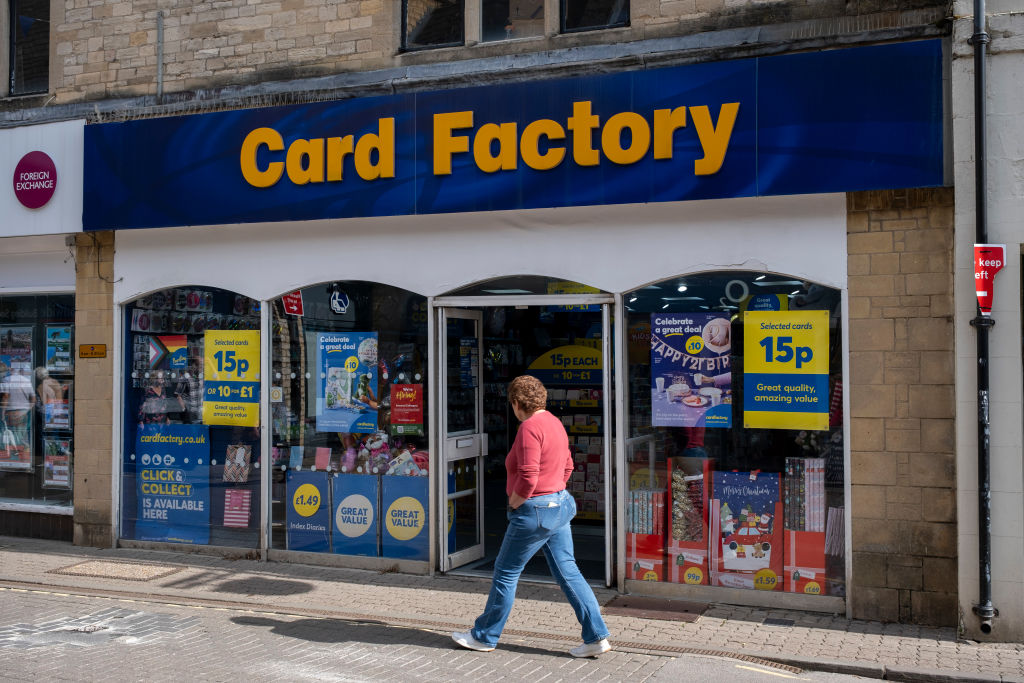Frasers Group 'is a rare retail gem in a battered sector'
Frasers Group is shunned for a reason, but brave investors should buy in now, says Jamie Ward

Get the latest financial news, insights and expert analysis from our award-winning MoneyWeek team, to help you understand what really matters when it comes to your finances.
You are now subscribed
Your newsletter sign-up was successful
Want to add more newsletters?

Twice daily
MoneyWeek
Get the latest financial news, insights and expert analysis from our award-winning MoneyWeek team, to help you understand what really matters when it comes to your finances.

Four times a week
Look After My Bills
Sign up to our free money-saving newsletter, filled with the latest news and expert advice to help you find the best tips and deals for managing your bills. Start saving today!
Frasers Group isn’t the kind of company that wins awards for corporate governance or sustainability. It’s not the darling of environmental, social and governance (ESG)- focused funds, nor does it feature heavily in the portfolios of institutional investors.
Its majority owner, Mike Ashley, is a lightning rod for controversy – a maverick who seems to thrive on defying convention. Yet, beneath the headlines and the market’s disdain, Frasers Group has quietly compounded its book value per share at an impressive rate annually since listing in 2007.
At today’s share price, this retail empire looks dirt cheap. For contrarian investors willing to stomach some volatility, Frasers Group might just be a great opportunity.
MoneyWeek
Subscribe to MoneyWeek today and get your first six magazine issues absolutely FREE

Sign up to Money Morning
Don't miss the latest investment and personal finances news, market analysis, plus money-saving tips with our free twice-daily newsletter
Don't miss the latest investment and personal finances news, market analysis, plus money-saving tips with our free twice-daily newsletter
Mike Ashley: a maverick at the helm of Frasers Group
The company’s story begins with Mike Ashley. He founded Sports Direct in 1982 with a single store in Maidenhead, armed with little more than a £10,000 loan from his family and a knack for spotting a bargain.
Fast forward four decades, and that single store has morphed into Frasers Group, a sprawling retail conglomerate valued in the billions of pounds. Ashley, now 60, remains the majority shareholder with a 73% stake, giving him near-total control over the company.
Ashley’s journey hasn’t been without turbulence. His tenure has been marked by a string of controversies that have made him a polarising figure in British business.
In 2016, a parliamentary inquiry into working conditions at Sports Direct’s Shirebrook warehouse exposed zero-hour contracts, below-minimum-wage payments, and a culture that allegedly penalised workers for taking breaks. Headlines screamed of “Victorian” work practices, and the share price took a battering.
More recently, in 2020, tax officials considered investigating Frasers Group over furlough payments during the pandemic, raising the spectre of millions being clawed back by the Treasury.
Ashley’s combative style hasn’t helped; he’s clashed with everyone from MPs to shareholders to the City establishment, often dismissing critics with a bluntness that borders on disdain.
Yet for all the noise, Ashley’s record speaks for itself. Since Frasers Group listed on the London Stock Exchange in 2007 as Sports Direct International, it has transformed from a single-brand sportswear retailer into a diversified retail powerhouse. It now owns a portfolio of brands spanning House of Fraser, Flannels, Jack Wills, and Game, alongside its core Sports Direct business.
Ashley’s strategy – buying distressed retail assets on the cheap, stripping out costs, and turning them around – has proved effective. House of Fraser, acquired for £90 million in 2018 after it fell into administration, is a case in point. By 2024, the department-store chain was contributing to group profits, a feat few thought possible when he bought it.
Frasers Group’s unconventional approach extends beyond Ashley’s leadership style. The company is a poor fit for the ESG criteria that dominate modern investing.
On the environmental front, its reliance on fast fashion through brands such as Sports Direct and Jack Wills raises red flags. The retail sector is under increasing scrutiny for its carbon footprint and waste, and Frasers Group has been slow to adopt the sustainability initiatives that peers such as H&M or Next trumpet in their annual reports.
Socially, the group’s history of labour controversies continues to haunt it. While working conditions have reportedly improved since the 2016 scandal, the stain on its reputation lingers.
Why Frasers Group has been shunned by ESG investors
Governance, however, is where Frasers Group faces its most significant criticism. Ashley’s majority ownership means he effectively runs the show, leaving little room for independent oversight.
This alone is enough to make ESG-focused funds recoil, but the issues run deeper. Related-party transactions, a long-standing concern for shareholders, have repeatedly raised questions about conflicts of interest.
Ashley has a history of involving family members and close associates in the company’s dealings, often in ways that blur the lines between personal and corporate interests.
Frasers Group insists these transactions are conducted at arm’s length, but critics argue they undermine governance standards and prioritise Ashley’s personal network over shareholders.
These related-party dealings have drawn scrutiny from regulators and investors alike. The company has since improved its reporting, but the perception of cronyism persists.
For ESG-focused investors, this is a dealbreaker – governance scores for Frasers Group consistently rank in the bottom quartile of the FTSE 100, according to data from MSCI.
The lack of independent board oversight, combined with Ashley’s history of related-party transactions, makes the company a pariah in the eyes of ESG investors.
This has consequences. Frasers Group is little owned by professional investors, particularly the passive funds that have come to dominate global markets. In a world where ESG compliance increasingly dictates capital flows, companies such as Frasers Group are often overlooked.
Data from the London Stock Exchange shows that institutional ownership of Frasers Group is below 10%, compared with an average of 60% for FTSE 100 companies. Active fund managers, too, have shied away, wary of the headline risk and governance concerns.
The result is a stock that, despite its large size, trades in relative obscurity, ignored by the very investors who might otherwise bid up its price.
Frasers’ business model is as unconventional as its owner, yet its success is undeniable. Ashley has built the company on a foundation of opportunistic acquisitions and ruthless cost-cutting, a strategy that has allowed it to thrive in a retail sector littered with casualties.
Debenhams, Topshop and Arcadia are just a few of the high-street names that have collapsed in recent years, yet Frasers Group has not only survived but grown.
Since 2007, the company has expanded its store count from 400 to more than 1,500, with a presence in 20 countries.
Revenue has climbed from £1.3 billion in 2007 to £5.6 billion in 2024, and operating profits have risen from £150 million to £650 million over the same period.
The secret to this growth lies in Ashley’s ability to spot value where others see only risk. It involves snapping up struggling retailers at bargain prices, integrating them into the Frasers’ system, and leveraging the group’s scale to drive efficiencies.
This has allowed the group to diversify its portfolio, reducing its reliance on the sportswear market.
Today, Sports Direct accounts for just 50% of group revenue, down from 90% at the time of listing. Premium brands such as Flannels, which cater to a wealthier demographic, have become key drivers of growth.
Ashley’s unconventional tactics extend to operations. Frasers Group is known for its aggressive negotiating with suppliers, often securing discounts that competitors are unable to secure.
The company also invests heavily in its physical stores, bucking the trend of online-only retail. While peers such as Asos focus on e-commerce, Frasers has doubled down on experiential retail, transforming flagship stores into destinations with features such as in-store gyms and gaming zones. This strategy has paid off, with footfall in the group’s stores rising even as high-street visits declined overall.
Despite its operational success, Frasers Group’s share price tells a different story. As of March 2025, the stock trades at similar levels to 2012, despite continued earnings growth.
This is a steep discount to other listed retailers. The valuation gap is particularly striking given the company’s growth record. Since listing in 2007, Frasers Group has compounded its book value per share at a compound annual growth rate of 16%, which sums to a 13-fold increase in the last 18 years.
That’s an extraordinary achievement for a retailer operating in a sector known for thin margins and fierce competition. Over the same period, however, the share price has barely tripled.
The stock’s low valuation reflects the market’s unease with Ashley’s governance and the company’s ESG shortcomings, but for contrarian investors, this disconnect between price and fundamentals is precisely the opportunity.
An exemplary contrarian play
Frasers Group’s combination of a cheap valuation, strong growth and limited institutional ownership makes it a classic contrarian play. The market’s disdain for Ashley and his unconventional approach has created a valuation anomaly; a firm that consistently delivers double-digit growth trading at a paltry valuation. For investors willing to look past the headlines, the potential rewards are significant. Consider the numbers. If Frasers Group continues to compound book value at 16% annually, its book value per share will reach more than £8 by 2030. Even if the market continues to assign a conservative price-to-book ratio of 1.5, the share price could still be double its current level. The valuation is at historically low levels, and any rise will significantly boost shareholders’ returns.
Frasers Group may be controversial and overlooked by professional investors, but a straightforward analysis reveals a business that thrives through operational excellence and disciplined capital allocation.
Beneath the noise, Frasers runs a tight, profit-generating ship with a clear and consistent investment philosophy. At the core of its strategy is a tiered system of resource allocation, prioritising long-term value creation.
The first and foremost focus is on driving growth and efficiency within its existing operations. This involves investing in store refurbishments, logistics, technology, and brand development; moves that directly enhance customers’ experience and operational performance.
Frasers also takes an opportunistic approach to external investments. It deploys cash to acquire stakes in other businesses or to snap up properties at attractive, often distressed, prices. This contrarian, bargain-hunting mindset has allowed Frasers to pick up valuable assets on the cheap, strengthening its market position while competitors hesitate.
Once these internal and external investment opportunities have been exhausted, Frasers directs capital towards initiatives that offer mutual benefits with its commercial partners. These strategic partnerships often create synergies that boost both Frasers’ and its partners’ profitability, expanding the company’s influence across the retail sector.
Finally, Frasers prioritises returning excess capital to shareholders through aggressive share buybacks. This shareholder-friendly policy has been particularly effective: over the past seven years, the firm has repurchased and cancelled roughly 20% of its outstanding shares. This has enhanced value per share by around 25%, rewarding long-term investors with a larger slice of the company’s growing profits.
No contrarian bet is without risks, and Frasers has its share of challenges. Economic headwinds, such as slowing disposable incomes in the UK, could affect consumer spending, particularly in the budget segment where Sports Direct operates.
The retail sector remains fiercely competitive, with online players like Shein and Temu posing a growing threat to Frasers Group’s low-price model.
Frasers Group is not a stock for the fainthearted. But for those willing to embrace the contrarian case, the opportunity is compelling. A 13-fold increase in book value since 2007, a dirt-cheap valuation, and a business model that has proved its resilience make Frasers Group a rare gem in a battered retail sector. Brave investors may find themselves richly rewarded.
This article was first published in MoneyWeek's magazine. Enjoy exclusive early access to news, opinion and analysis from our team of financial experts with a MoneyWeek subscription.
Get the latest financial news, insights and expert analysis from our award-winning MoneyWeek team, to help you understand what really matters when it comes to your finances.
Jamie is an analyst and former fund manager. He writes about companies for MoneyWeek and consults on investments to professional investors.
-
 How a ‘great view’ from your home can boost its value by 35%
How a ‘great view’ from your home can boost its value by 35%A house that comes with a picturesque backdrop could add tens of thousands of pounds to its asking price – but how does each region compare?
-
 What is a care fees annuity and how much does it cost?
What is a care fees annuity and how much does it cost?How we will be cared for in our later years – and how much we are willing to pay for it – are conversations best had as early as possible. One option to cover the cost is a care fees annuity. We look at the pros and cons.
-
 How to profit from the UK leisure sector in 2026
How to profit from the UK leisure sector in 2026The UK leisure sector had a straitened few years but now have cash in the bank and are ready to splurge. The sector is best placed to profit
-
 How to harness the power of dividends
How to harness the power of dividendsDividends went out of style in the pandemic. It’s great to see them back, says Rupert Hargreaves
-
 Reinventing the high street – how to invest in the retailers driving the change
Reinventing the high street – how to invest in the retailers driving the changeThe high street brands that can make shopping and leisure an enjoyable experience will thrive, says Maryam Cockar
-
 Defeat into victory: the key to Next CEO Simon Wolfson's success
Defeat into victory: the key to Next CEO Simon Wolfson's successOpinion Next CEO Simon Wolfson claims he owes his success to a book on military strategy in World War II. What lessons does it hold, and how did he apply them to Next?
-
 LVMH is set to prosper as the wealthy start shopping again
LVMH is set to prosper as the wealthy start shopping againAfter two years of uncertainty, the outlook for LVMH is starting to improve. Is now a good time to add the luxury-goods purveyor to your portfolio?
-
 Card Factory is a stand-out small-cap going cheap
Card Factory is a stand-out small-cap going cheapIn a digital world, we still value the personal touch. That’s good news for Card Factory, whose unique business model is suited to weather all economic storms
-
 Last orders: can UK pubs be saved?
Last orders: can UK pubs be saved?Pubs in Britain are closing at the rate of one a day, continuing and accelerating a long-term downward trend. Why? And can anything be done to save them?
-
 Global investors have overlooked some of China’s best growth stocks
Global investors have overlooked some of China’s best growth stocksOpinion Dale Nicholls, portfolio manager, Fidelity China Special Situations, highlights three Chinese businesses where he’d put his money